Risque
Le rapport « La situation mondiale des transferts monétaires » du CaLP Network indique que l’idée selon laquelle les transferts monétaires seraient plus risqués que d’autres formes d’aide est l’une des barrières principales à l’utilisation fréquente de cette modalité. Ces craintes sont liées à l’insistance de plus en plus franche des bailleurs concernant la lutte contre le terrorisme et contre le blanchiment d’argent, et à l’amenuisement des budgets destinés à l’assistance humanitaire. Le travail du CALP Network sur cette problématique vise à combattre les idées reçues, à faciliter la collaboration et à partager les apprentissages afin de veiller à ce que les transferts monétaires soient systématiquement considérés, tout comme d’autres modalités, en fonction des données probantes disponibles sur les risques réels de toutes les modalités.
Priorités actuelles
Plusieurs organisations travaillent actuellement sur les risques entraînés par les transferts monétaires. Le CALP Network cherche à identifier les synergies entre acteurs, à éviter les duplications et à définir des priorités communes sur lesquelles nous pourrions agir plus efficacement en groupe. Avec le PAM, le CALP Network co-dirige l’élément Risques, priorité du chantier du Grand Bargain sur les transferts monétaires.
Contenu présenté
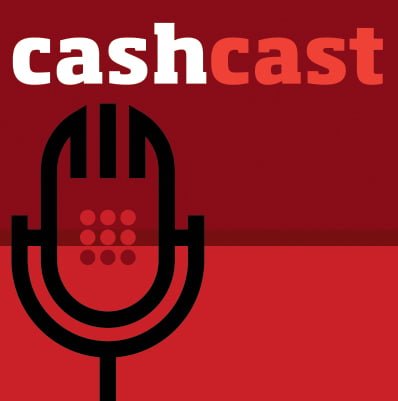
Podcast: Will risk aversion hold us back from realizing the potential of CVA?
Podcast
Episode 1 of the CashCast, exploring how attitudes to risk have impacted the use of CVA in the Middle East and North Africa region.

Transferts monétaires et risques : ce qui se passe sur le terrain, reste sur le terrain (et pourquoi c’est un problème)
Blog Post
En octobre 2019, le CALP Network a facilité à Douala, au Cameroun, une réunion de partage d’expériences sur les risques liés à la protection des bénéficiaires dans les interventions monétaires. Cette réunion restreinte, organisée dans le cadre d’une série de rencontres dans différentes régions, a permis à 25 travailleurs humanitaires d’Afrique de l’Ouest et du Centre,...

Webinar: Data sharing in CVA: ethics, ownership and privacy
Event
Thematic lead
Contenu récent

Towards Organizational Readiness for Data Responsibility: A simple framework for responsible data champions
Blog Post
This blog is the third in a series on cash and voucher assistance (CVA) and risk. While the first blog busted some myths around misappropriation and fraud in CVA, the second blog looked into a specific risk for recipients of CVA: the risk of misuse of personal data. This third, guest blog from Linda...

Identification Et Attenuation Des Risques D’Abus De Pouvoir Lies A L’assistance Monetaire Au Burundi
Rapport
Ce document présente les enseignements tirés de la mission conjointe HCR-PAM au Burundi visant à identifier et à atténuer les risques d’abus de pouvoir liés à l’assistance monétaire. L’analyse s’est focalisée sur l’assistance monétaire par téléphone mobile pour le retour volontaire...

How Will Financial Assistance Look in 2030? Here are your thoughts so far
Blog Post
In 2030, humanitarian crises and the ways in which humanitarian needs are met will look very different from today. The role of financial assistance is growing: it is estimated that $4.8 billion was delivered in cash and voucher assistance (CVA) in 2018, as well as $686 billion in remittances, while 2.5...

Mitigating Risks of Abuse of Power in Cash Assistance in Afghanistan
Report
This document outlines lessons learned from a joint UNHCR-WFP project in Afghanistan aimed at identifying and mitigating the risks of abuse of power in cash assistance. The cash transfer mechanisms discussed during the mission were cash distribution through Hawalas, mobile token, mobile e-vouchers and...
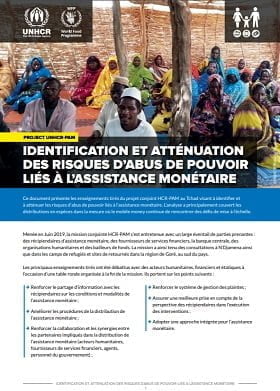
Identification et atténuation des risques d’abus de pouvoir liés à l’assistance monétaire au Tchad
Rapport
Ce document présente les enseignements tirés du projet conjoint HCR-PAM au Tchad visant à identifier et à atténuer les risques d’abus de pouvoir liés à l’assistance monétaire. L’analyse a principalement couvert les distributions en espèces dans la mesure où le mobile money continue de...

Data Responsibility: Let’s not wait for another wake up call
Blog Post
This blog is the second in a series on cash and voucher assistance (CVA) and risk. While the first blog busted some myths around misappropriation and fraud in CVA, this second blog looks into a specific risk for recipients of CVA: the risk of misuse of personal data.
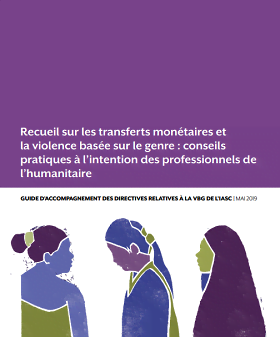
Recueil sur les transferts monétaires et la violence basée sur le genre : conseils pratiques à l’intention des professionnels de l’humanitaire
Guides et outils
Ce recueil de conseils pratiques sur les transferts monétaires (TM) et la violence basée sur le genre (VBG) a pour objectif d’aider les acteurs humanitaires et les communautés touchées par des crises et des conflits à: intégrer l’atténuation des risques de VBG dans les interventions...

Cash and Crises Series Episode 2: The Role of Central Banks in Disaster Management
Video
Watch the video here Cash and Crises is a series of financial literacy audiographics brought to you by CashEssentials, a private sector initiative with a social mission to support the relief and development community in understanding how cash is managed for society in times of crisis. In Episode 2,...

Cash is no Riskier than Other Forms of Aid. So Why Do We Still Treat In-kind like the Safer Option?
Blog Post
The first in a new series of blogs on cash and voucher assistance and risk, this article from the CALP Network’s Stefan Bumbacher debunks some common myths around the risk of misappropriation and fraud in CVA.

The UN Common Cash Platform: What does it mean and how is the IRC responding?
Blog Post
Together our members and partners have strengthened the evidence base and advanced the debate around gender and cash and voucher assistance. Looking ahead, how can we ensure we turn talk into action to deliver quality CVA for everyone?

Mitigating Risks of Abuse of Power in Cash Assistance in Rwanda
Report
This document outlines lessons learned from a joint UNHCR-WFP project in Rwanda aimed at identifying and mitigating the risks of imbalance of power in cash assistance. The cash transfer mechanism reviewed during the project was a bank card, proposed to the overwhelming majority of refugees receiving cash...

Cash and Crises Series Episode I: Digital Money
Video
Cash and Crises is a series of financial literacy audiographics brought to you by CashEssentials, a private sector initiative with a social mission to support the relief and development community in understanding how cash is managed for society in times of crisis. In Episode 1, we start with a short...
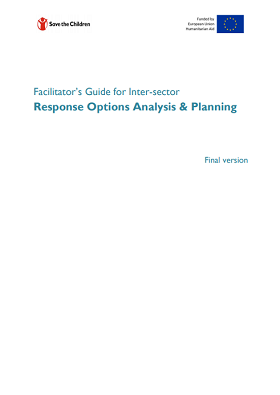
Response Options Analysis Planning Guide
Guidelines and Tools
The inter-sector Response Options Analysis and Planning (ROAP) is a structured decision-making process, which draws from the information generated through a multitude of needs and operational environment assessments. The ROAP gives way to the selection of the most appropriate, operationally feasible and...

Harmonising registrations and identification in emergencies in Somalia – Briefing
Report
This briefing highlights the benefits, risks and challenges associated with establishing an integrated data system for cash transfer programming (CTP), based on the findings of a study that examined how different humanitarian agencies in Somalia are managing the collection, analysis and sharing of...

Feasibility Study on Cash Transfer Programming for the Returnees and the Host Communities in Gedeo and West Guji in Ethiopia
Report
This document reveals the outcome of a feasibility study on cash transfer programming targeted for the returnees and the host communities in Gedeo and West Guji Zones.
The major objectives of the study were as follows:
1. Understand general cash transfer environment in Ethiopia
2. Validate the needs of...

Analyse des dynamiques sociales et des pouvoirs des parties prenantes pour la mise en place de Transferts Monétaires à Usage Multiple (TMUM) pluriannuels au Nord Mali
Rapport
Six ONG internationales (Action contre la Faim, Danish Refugee Council, Handicap International, International Rescue Committee, Oxfam et Solidarités International) ont mis en place un programme de transferts monétaires à usage multiple au Mali ; la deuxième phase de cette intervention de filets...
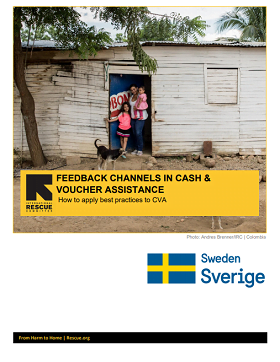
Feedback Channels in Cash and Voucher Assistance: How to Apply Best Practices to CVA
Guidelines and Tools
Accountability is at the core of effective humanitarian programming, and it is our duty to ensure that all programs – including those that use CVA to meet outcomes – are responsive to the clients we serve. While CVA is not inherently more risky than other forms of assistance, there are specific...

Reflections and recommendations from evaluations of the 2017 CVA Somalia Drought Response
Report
Improving our response to drought to avert crises through the use of cash and voucher assistance requires us to build on experience. This paper pulls together reflections and recommendations from a review of eight evaluation reports, reviews and studies that were conducted during or after the 2017 drought...

Mitigating Risks of Abuse of Power in Cash Assistance in Iraq
Report
This document outlines lessons learned from a joint UNHCR/WFP project in Iraq aimed at identifying and mitigating the risks of abuse of power in cash assistance. The cash transfer mechanisms reviewed during the
project include mobile money, e-vouchers and cash delivered through money transfer agents.

6 Key Points to Address: Using Learning to Strengthen Cash and Voucher Assistance in the 2019 Drought Response in Somalia
Report
A summary of learning from Evaluation reports from the 2017 Somalia drought response.



